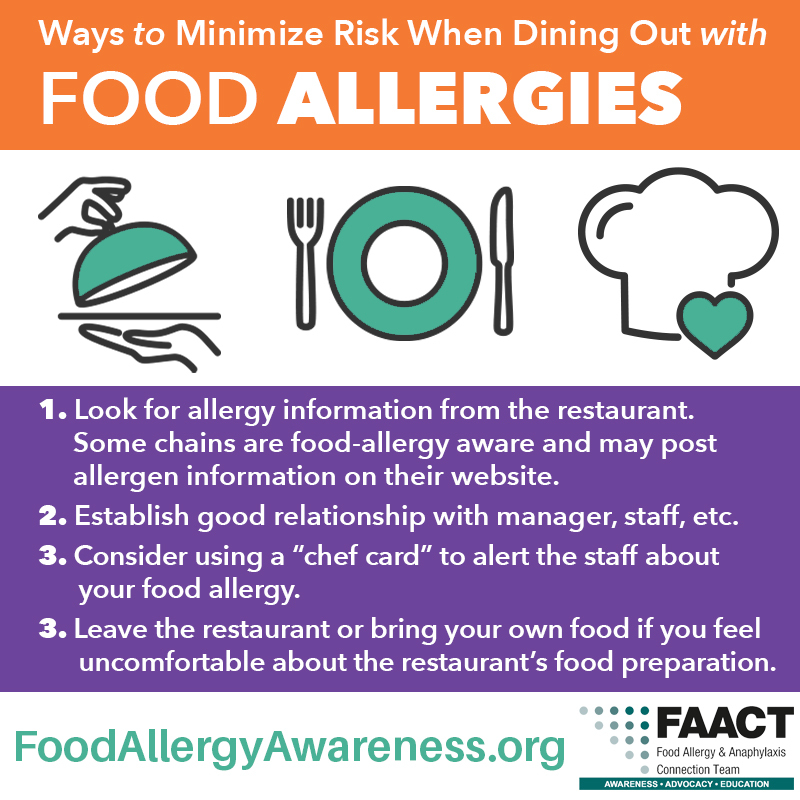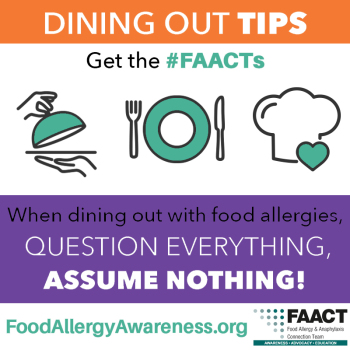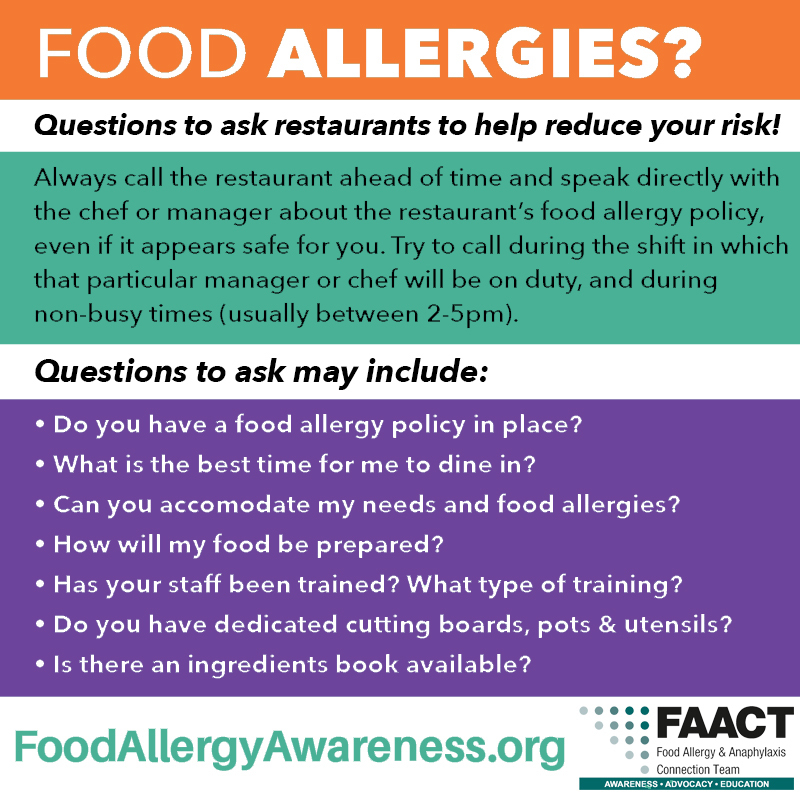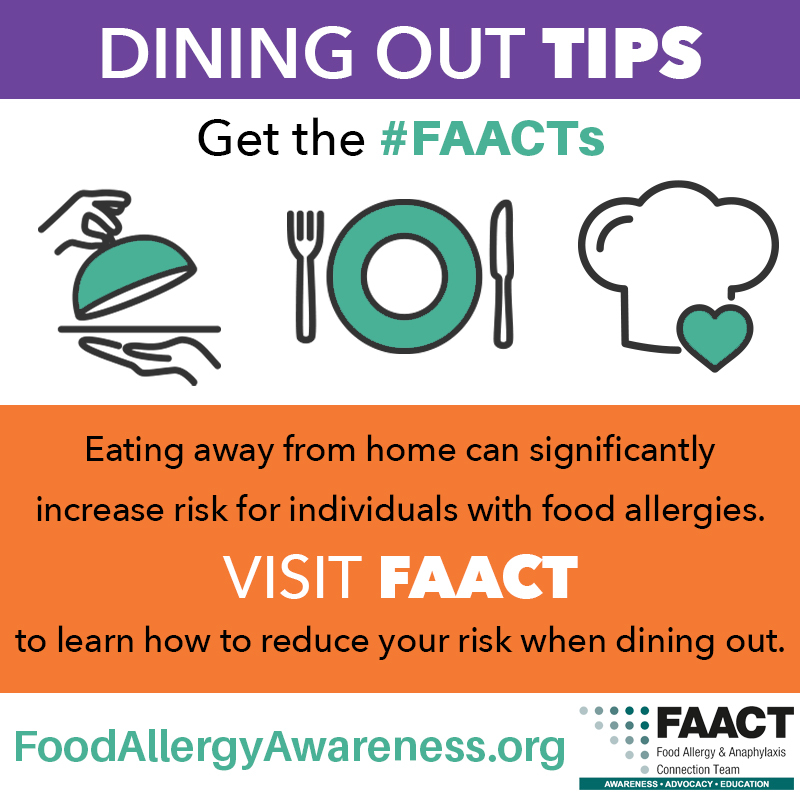Dining Out

Dining Out
Eating out at a restaurant, bakery, cafeteria, or fast food establishment can be an enjoyable and convenient experience. However, because you have food allergies, it’s imperative that every precaution has been taken to ensure the food being served to you is safe. Even then, it should not be relied on as a guarantee. Families and adults who eat out should always carry two (2) epinephrine devices at all times and be prepared to act quickly in an emergency.
Creating a “team” with the restaurant staff is an important goal for food-allergic diners. The team should include the restaurant’s management team, front-of-the-house employees (hostess, floor manager, wait staff, server, etc.), back-of-the-house employees (kitchen manager, line and prep cooks, food runners, etc.), and you. Another area that should not be overlooked is the bar (bartenders), where allergens can be found in mixers and alcohol.
If restaurant staff does not seem genuinely concerned about working with you to accommodate your needs, or if they appear to have little knowledge of food allergies, it’s best to seek another dining option.

When dining out with food allergies, question everything, assume nothing!
Do not assume that a bakery promoting allergy-free foods is safe.
--- Question the bakery about their policy and knowledge, specifically on “food allergies.”
Do not assume that a restaurant has a good policy in place just because is promotes itself as “allergy aware.”
--- Question what type of food allergy policy is in place. Ask the manager to walk you through the entire meal preparation.
Do not assume an item is free from your allergen because it “sounds” free.
--- Question whether the item contains allergens or not. For example, depending on the manufacturer, “imitation crab” can, in fact, contain real shellfish in addition to soy, wheat, and fish
Do not assume your server knows the ingredients, even if he or she says they do.
--- Question the ingredients in a dish with the chef and manager.
Do not assume your server will remember you on your next visit or your allergens, even if you frequent the restaurant often.
--- Question food ingredients and inform the hostess and wait staff of your allergy each visit.
Do not assume because you had a dish once with no issues, the dish will be safe each visit.
--- Question if the dish contains your allergen and if products have changed since your last visit.
Do not assume because you cannot see your allergen in a dish, that the dish does not contain it.
--- Question what the item is made from and ask if it contains your allergen.
Do not assume the server, manager, or chef understands the severity of your allergy.
--- Question whether they understand the difference between a true allergy, vegan, gluten, or other intolerances and dietary restrictions.
On the other hand, do assume the manager, server, or chef does not understand the severity of your allergy.
--- Question yourself as to why they feel uneasy to confirm a particular dish can be created for you safely. If you sense any hesitation from the staff about any food item, don’t chance it. Avoid it!
In facing the increase in food allergies among children and adults across the nation, the need for food allergy education and resources continues to grow.
FAACT, together with the food allergy community, advocates, trained professionals, experts, and other associates, will create a comprehensive training program in the best interest of both the food-allergic individual and food service establishments.

Tips for Preparing to Dine Out
Reduce Your Risk!
- Always call the restaurant ahead of time and speak directly with the chef or manager about the restaurant’s food allergy policy, even if it appears safe for you. Try to call during the shift in which that particular manager or chef will be on duty, and call during non-busy times (usually between 2pm-5pm). Questions to ask may include:
- Do you have a food allergy policy in place?
- Can you accommodate my needs and food allergies?
- How will my food be prepared?
- Have your staff been trained on food allergies? What type of training?
- Do you have dedicated cutting boards, pots, and utensils?
- Is there an ingredients list available?
- Avoid dining during busy times (e.g., dinner rush, holidays, after church, and weekends).
- Compile a list of questions to ask before you go.
- Upon arrival, inform the hostess and server of your allergens and ask to speak to the manager on duty. Wipe down your seats, the table, and menus with a hand wipe.
- Order simple foods. Dishes with sauces or that are cooked on the grill or in the fryer can increase your risk for cross-contact with allergens.
- Avoid high-risk situations, including:
- Buffets, self-serve shops, and deli stations (cross-contact risk).
- Bakeries and ice cream shops (cross-contact risk).
- Restaurants with a heavy concentration of your allergen.
- Pizza or sandwich shops (cross-contact risk).
- Events and venues serving ingredients you are not familiar with.
- Events or venues that may present barriers to effective communication due differences in language (cards are available in many languages from Equal Eats).
- Ways to minimize risk when dining out with food allergies:
- Look up allergy information online. Some chain restaurants post detailed allergen information on their websites.
- Communicate clearly and often while asking critical questions.
- Use a chef's card to communicate your allergies to servers and kitchen staff (cards are available in many languages from Equal Eats).
- NOTE: Please keep in mind in a culturally diverse world, different ingredients may be used in different recipes. Always use extreme caution.
- If you don't feel comfortable with food preparation, politely leave the restaurant.
- Always carry your prescribed medications and act quickly in the event of an emergency! Know the "Signs and Symptoms of Anaphylaxis."
- If a mistake is made, keep the dish at your table rather than have the staff return it to the kitchen. Once the new dish has been prepared properly, you can return the old dish. This will ensure that the allergen was not just "removed."
- Prepare for the unexpected. Pack a small snack in case the restaurant is not able to cater to your needs.

FAACT
In a study involving one staff member from each of 100 different food service establishments1, food-allergy training was reported by 42 percent. Regarding knowledge questions:
- 24 percent believed consuming a small amount of allergen would be safe.
- 35 percent believed that fryer heat would destroy allergens.
- 54 percent considered a buffet safe if kept “clean”.
- 25 percent thought that removing an allergen from a finished meal (taking off nuts) was safe.
Ahuja, R and Sicherer, SH. “Food-allergy management from the perspective of restaurant and food establishment personnel.” Annals of Allergy, Asthma and Immunology.2007 Apr; 98(4):344-8.

